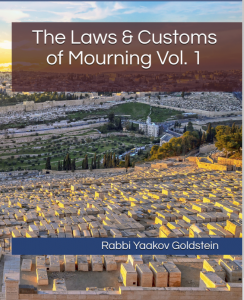This article is an excerpt from our Sefer
Who is obligated to pay for the burial plot if the relative that died cannot afford it?[1]
Wife passed away:[2] If one’s wife passes away, it is the husband’s obligation to pay for the burial expenses.
Father passes away, or unmarried mother: The children are obligated to purchase a burial plot for their father or mother, if the parent did not do so prior to passing away, and left an inheritance for their children.[3] If however they did not leave any inheritance for their children, then the children are not obligated to pay for the burial expenses, and the expense rather falls onto the community.[4] Other Poskim[5] however rule that this only applies if the deceased pronounced prior to death that he does not want to be buried from his assets. However if he did not make any statement then even if the children did not receive any inheritance from the parents, nevertheless they are obligated and enforced to pay for the expenses if they can afford to do so.
What expenses are included in the above obligation? The above obligation includes all the expenses involved in the commonly done burial of that family. It includes even the tombstone/Matzeiva that is later erected on the grave.
May children use Maaser money for the burial expenses of a parent?[6]
Children may not use Maaser money to purchase a plot or Matzeiva for their father or mother.[7]
[1] See Michaber 348/2; Choshen Mishpat 253/31
[2] Aruch Hashulchan 348/2
[3] Michaber 348/2; Choshen Mishpat 253/31
[4] Shach 348/5 as is implication of Michaber ibid; Aruch Hashulchan ibid
[5] Maharam Mintz 51-53; Beis Hillel ibid; Gilyon Maharsha; Aruch Hashulchan ibid rules they are obligated to pay in call cases, even if the father said the above.
[6] Minchas Shlomo 2/97-11; Maaser Kesafim 14/56; Shraga Hameir 5/43
[7] The reason: As we rule like the Poskim that say the children are obligated to pay for the burial even if they did not receive an inheritance. [See Michaber 348/2; Choshen Mishpat 253/31; Maharam Mintz 51-53; Beis Hillel ibid; Gilyon Maharsha; Aruch Hashulchan 348/2]




Leave A Comment?
You must be logged in to post a comment.